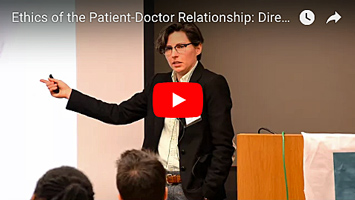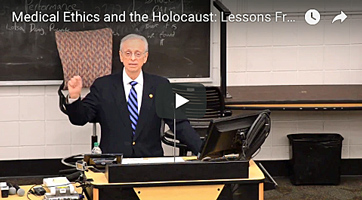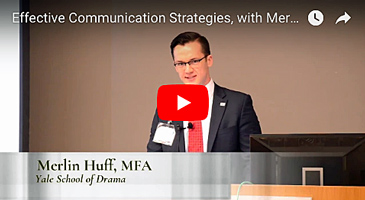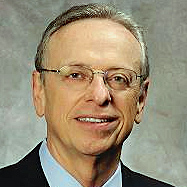Direct Primary Care: Ethics of the Patient-Doctor Relationship—Heather Bartlett, MD
April 19, 2018 by
[et_pb_section bb_built=”1″ _builder_version=”3.0.106″][et_pb_row _builder_version=”3.0.106″][et_pb_column type=”1_2″][et_pb_video _builder_version=”3.5.1″ src=”https://youtu.be/GLMSGcL7UuQ” /][et_pb_text _builder_version=”3.5.1″]
Many assert that government regulation is the only way to solve healthcare cost and access issues.
In her presentation, A look at the Ethics of the Patient-Doctor Relationship through the Eyes of a Direct Primary Care Physician, Dr. Heather Bartlett, a DPC doctor-pioneer, dismantles this concept, walking us through her DPC-modeled practice, actively restoring and protecting the patient-doctor relationship.
Visit her website: The Bartlett Medical Clinic & Wellness Center
[/et_pb_text][/et_pb_column][et_pb_column type=”1_2″][et_pb_cta _builder_version=”3.0.106″ url_new_window=”off” use_background_color=”on” background_layout=”dark” custom_button=”off” button_icon_placement=”right” background_color=”#2d9b8a”]
Dr. Bartlett opened Columbus’ first direct primary care clinic, The Bartlett Medical Clinic & Wellness Center in 2016 after witnessing thousands of patients’ frustrating healthcare experiences both in cost and reasonable access. She saw this throughout her various roles in healthcare settings—as emergency room physician, healthcare system employed outpatient primary care physician, pre-admission screening physician, and finally as an urgent care physician at one of the busiest centers in Central Ohio. She wanted to help change both the access and cost issues for the uninsured, under-insured, and insured for primary care in Ohio’s capital, Columbus.
[/et_pb_cta][/et_pb_column][/et_pb_row][/et_pb_section]
Medical Ethics and the Holocaust: Lessons From the Past—Raul Artal, MD
April 19, 2018 by
[et_pb_section bb_built=”1″ _builder_version=”3.0.106″][et_pb_row _builder_version=”3.0.106″ background_position=”top_left” background_repeat=”repeat” background_size=”initial”][et_pb_column type=”1_2″][et_pb_video _builder_version=”3.0.106″ src=”https://youtu.be/-t9UazSZJ9U” /][et_pb_text _builder_version=”3.0.106″ background_layout=”light”]
Are medical ethics and physician loyalty intertwined?
To whom does a doctor owe loyalty? An employer or insurance contract, a government or “state’s” rules, or to the patient?
What happens when regulations, government policy, and other third parties insert their priorities into medical decision making? Sometimes effects are hard to discern and seem innocuous—but what about when demands on physicians are less benign?
Read Dr. Artal’s opinion piece, Medicine After the Holocaust
[/et_pb_text][/et_pb_column][et_pb_column type=”1_2″][et_pb_cta _builder_version=”3.0.106″ url_new_window=”off” use_background_color=”on” background_layout=”dark” custom_button=”off” button_icon_placement=”right” background_color=”#2d9b8a”]
Dr. Artal, a Holocaust survivor, was born in a Nazi concentration camp. He is the Chairman and Professor Emeritus of the Department of Obstetrics, Gynecology and Women’s Health at Saint Louis University. He is largely responsible for changing societal views on exercise during pregnancy.
[/et_pb_cta][/et_pb_column][/et_pb_row][/et_pb_section]
Effective Communication Strategies—Merlin Huff, MFA
April 13, 2018 by
[et_pb_section bb_built=”1″ _builder_version=”3.0.106″][et_pb_row _builder_version=”3.0.106″][et_pb_column type=”1_2″][et_pb_video _builder_version=”3.0.106″ src=”https://youtu.be/d7IvSbnY-lI” /][et_pb_text _builder_version=”3.0.106″ background_layout=”light”]
What is the best way to engage in a conversation when deeply held beliefs and ideas clash? Is there a way to frame a conversation that allows for real communication—not just “winning” or “losing” an argument?
[/et_pb_text][/et_pb_column][et_pb_column type=”1_2″][et_pb_cta _builder_version=”3.0.106″ url_new_window=”off” use_background_color=”on” background_layout=”dark” custom_button=”off” button_icon_placement=”right” background_color=”#2d9b8a”]
Merlin Huff earned an MFA from the Yale School of Drama, and has worked as both a film and stage actor. Owner of Huff Studios, Merlin helped actors and non-actors understand and step into the shoes of personalities and viewpoints very different from their own. Merlin spent two years as a management consultant, and now holds the role of Integrator at a real estate company in South Dakota.
[/et_pb_cta][/et_pb_column][/et_pb_row][/et_pb_section]
The Investment in Health: Doctors also need to be involved in healthcare policy discussions
April 9, 2018 by
In early February, I was fortunate enough to attend AcademyHealth’s National Health Policy Conference in Washington, DC, due to a generous scholarship from Benjamin Rush Institute. At this conference, I learned about the intricacies of Medicaid state innovation waivers, how multi-payer episodes of care payment models are being implemented in various states, and the difficulties of passing any healthcare bill in the current political climate. What struck me most, however, was not the specific content of any one lecture, but rather the range of people with whom I was in attendance. The seemingly marginal number of healthcare providers amongst the lawyers, economists and other policy makers surprised me.
Although I recognize the importance of professional collaboration in forming any national policy, it was discouraging that there were not more physicians at the forefront of the conversations regarding the future of care in our country. The policies resulting from these discussions have the potential to impact doctors’ most basic patient interactions and can affect our ability to provide what we believe to be the best possible care.
Not only do we need to actively encourage more physicians to take a seat at the table in this discussion, we should also be empowering and educating our patients to be involved as well. We had the pleasure of listening to the Surgeon General Dr. Jerome Adams discuss how he plans to tackle the opioid epidemic in America. His message emphasized how the vast majority of the American public does not vote based on considerations of health, but rather on jobs, the economy and national security. He quoted the staggering statistic that in the United States, seventy-percent of eighteen to twenty-four year-olds are ineligible for military service due to health concerns. In this way, health is drastically impacting our national security. We need to reframe healthcare in such a manner so that everyone in our country understands its true impact on society. This will incentivize more people to invest themselves in discussions of how they believe care should be provided.
I have always felt a strong duty to engage in the issues affecting my ability to care for my patients, but after this conference, I now know that also means actively encouraging my colleagues to take part in this discussion as well. In order to be true advocates for our patients, we as healthcare professionals must stand for them at the individual, local and national levels. We need an active role in the policy making process to ensure preservation of the sanctity of the physician-patient relationship.
February 5, 2018 by
All are welcome to join us at this free panel discussion of the relationship between the tenets of social justice and their impact on the patient-doctor relationship. This event will be held on OSU’s campus in Meiling Hall #160, is free to the public and greater student body.
Is the cultural trend toward social justice beneficial or toxic to the patient-doctor relationship?
Presentations: 6:00pm – 7:30pm
OSU Meiling Hall, Room #160
370 W 9th Ave, Columbus, OH 43210
A panel discussion is not a debate. The purpose of the evening is not to create winners and losers—but to deepen everyone’s understanding of today’s pressing healthcare issues. Too often in healthcare discussions, terms are used without clarity, or without really thinking through the possible downsides of what is being proposed. By investigating various view points we can best sort out the strength and weaknesses of various options, and come to our own conclusions about what best serves the patient-doctor relationship.
Representing that the tenets of social justice are compatible with the ethical requirements of the patient-doctor relationship:
Daniel Skinner, Ph.D., is Assistant Professor of Health Policy in the Department of Social Medicine at Ohio University’s Heritage College of Osteopathic Medicine, in Dublin, Ohio, Adjunct Assistant Professor in the Department of Pediatrics, The Ohio State University (at Nationwide Children’s Hospital), and Assistant Director of the Health Policy Fellowship, a certificate program of the American Association of Colleges of Osteopathic Medicine. His areas of expertise include health care politics and policy; the politics of medicine and disease; hospital-community relations; and health care for vulnerable and underserved populations.
2nd panelist for this position TBA.
Representing that the tenets of social justice are not compatible with the ethical requirements of the patient-doctor relationship:
Dr. Ryan Nash, MD, MA, FACP, FAAHPM, is the Director of The Ohio State University Center for Bioethics and Director, Division of Biomedical Education and Anatomy. He is an Associate Professor of Medicine and holds the Hagop Mekhjian, MD, Chair in Medical Ethics and Professionalism at the College of Medicine. In addition to practicing Palliative Medicine, Dr. Nash is a Clinical Bioethics consultant and Healthcare Ethics Advisor for the OSU Medical Center. He has published one book, three book chapters, and several essays related to bioethics and has presented numerous scientific papers and invited lectures at national and international meetings. In addition, Dr. Nash currently serves on the Ethics Committee for the American Academy of Hospice and Palliative Medicine.
2nd panelist for this position TBA.
Moderator: TBA
February 5, 2018 by
For the first time, Benjamin Rush Institute is opening its Friday Keynote Luncheon address with Dr. Raul Artal to the greater OSU, OUHCOM, other local universities, and the greater Columbus community.
Friday’s luncheon event is part of BRI’s annual student Leadership Conference and is typically a private event for attending students only. This year’s conference theme is Ethics of the Patient-Doctor Relationship, and we find the questions and dialogue that are part of this discussion to be so vital to influencing positive healthcare policy, that we are opening this up to reach more people.
Medical Ethics and the Holocaust: Lessons From the Past
Raul Artal, MD, FACOG, FACSM will be our luncheon Keynote Speaker on the topic Medical Ethics and the Holocaust: Lessons From the Past.
Dr. Artal, a Holocaust survivor, was born in a Nazi concentration camp. He is the Chairman and Professor Emeritus of the Department of Obstetrics, Gynecology and Women’s Health at Saint Louis University. He is a graduate of Sackler School of Medicine, Tel Aviv University (where BRI has thriving chapter!), the author of over 200 publications and three books and is internationally recognized for his expertise in high risk obstetrics, exercise physiology, and ethical standards in medical practice/research.
Viewpoint: Medicine After the Holocaust
Lunch is guaranteed to those who RSVP 48-hours in advance. REGISTRATION FORM.
(Students already accepted to the leadership conference do NOT need to register.)
For more information about the conference, please see our 2018 Leadership Conference web page.




